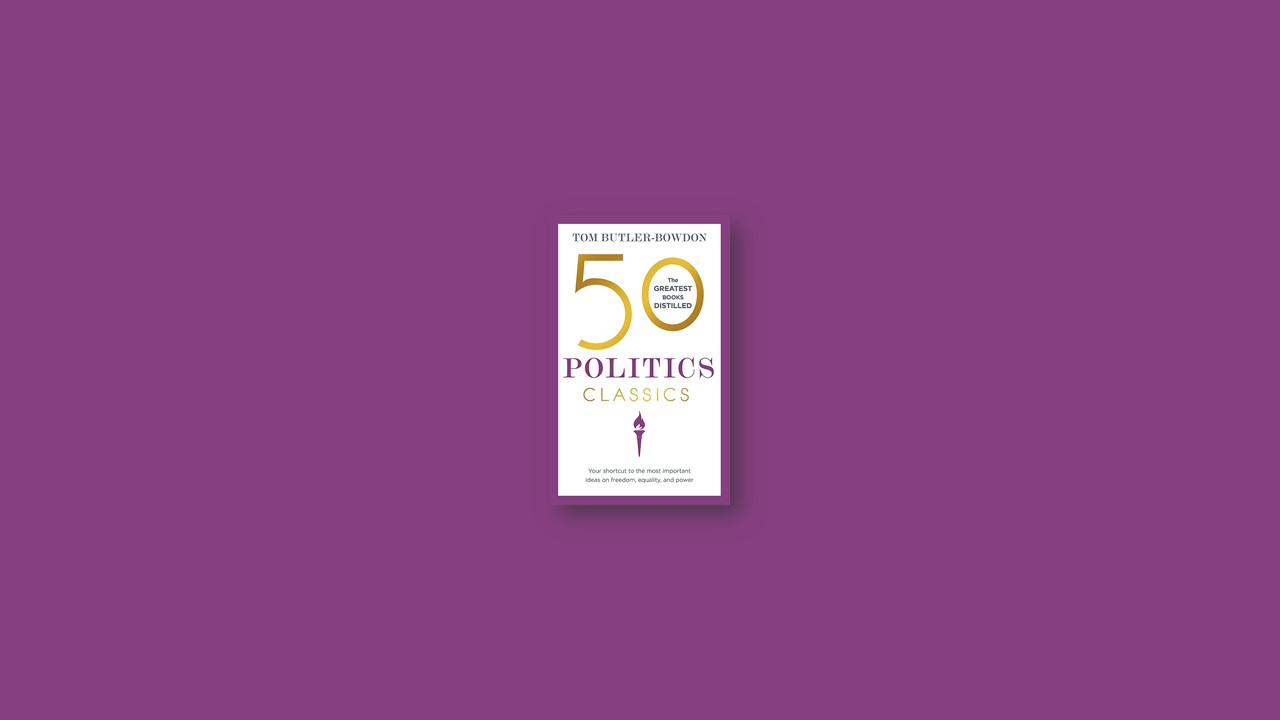1 Lord Acton Essays on Freedom and Power (1948)
Politics must rest on a moral foundation that accords freedom to people for the sake of it.
2 Daron Acemoglu & James A. Robinson Why Nations Fail: The Origins of Power, Prosperity, and Poverty (2012)
The poorest countries in the world have something in common: failed political institutions. Without the stability and transparency that good government brings, the incentive to create wealth disappears.
3 Saul Alinsky Rules for Radicals: A Pragmatic Primer for Realistic Radicals (1971)
Radicals need to understand the nature of power if they are ever to see their aims materialize.
4 Graham T. Allison & Philip Zelikow Essence of Decision: Explaining the Cuban Missile Crisis (1971/1999)
Political action is shaped by a range of actors and interests, but it still takes a superior leader to choose the best path among them.
5 Norman Angell The Great Illusion: A Study of the Relation of Military Power to National Advantage (1910)
War between advanced nations makes no sense in an age of economic integration.
6 Hannah Arendt The Origins of Totalitarianism (1951)
Totalitarian movements get their power from a claim to be the expressions of “inevitable” forces of Nature or History. Compared to these forces the individual life means little, and so is dispensable.
7 Aristotle Politics (4th century BCE)
The purpose of the state is to achieve the happiness and elevation of its citizens.
8 Isaiah Berlin Two Concepts of Liberty (1958)
What kind of freedom do we seek: to allow people to be as they are, or to give them the chance to live up to our vision of humanity and society?
9 Edward Bernays Propaganda (1928)
Propaganda is a neutral tool that can be used for good or ill, but in order to have power in modern society once must know its techniques.
10 Carl Bernstein & Bob Woodward All the President’s Men (1974)
Beyond laws and institutions, the best-known means of preventing corruption in government is a free press.
11 Edmund Burke Reflections on the Revolution in France (1790)
Revolutions always claim to be new beginnings for “the people,” but the price of destroying old institutions is instability and vulnerability to despots.
12 Rachel Carson Silent Spring (1962)
Because clean water and air and healthy soil are basic to life, the environment is arguably the most political issue.
13 Winston Churchill The Gathering Storm (1948)
The best political leaders are able to place current events within the context of history.
14 Carl von Clausewitz On War (1832)
With its psychological dimension war can never be a science, and even as an extension of policy it is a blunt instrument.
15 Francis Fukuyama The End of History and the Last Man (1992)
Liberal democracy will prove to be the only viable form of political organization because it is based on the universal desire for freedom and recognition.
16 Mohandas K. Gandhi An Autobiography: The Story of My Experiments with Truth (1927–29)
Power can be built on an unassailable moral stance.
18 Alexander Hamilton, John Jay, & James Madison The Federalist Papers (1788)
A unified republic with popular representation, strong executive powers and an independent judiciary is inherently more stable and prosperous than a loose confederation of states.
19 F.A. Hayek The Road to Serfdom (1944)
In a planned economy not only are resources allocated inefficiently, the life choices of individuals are progressively narrowed. A true democracy must be based on a free market economy.
20 Thomas Hobbes Leviathan, or the Matter, Forme and Power of a Common Wealth Ecclesiasticall and Civil (1651)
Under authoritarian rule life may not be perfect, but in return for some loss of freedom come order and physical protection.
21 Samuel P. Huntington The Clash of Civilizations and the Remaking of World Order (1996)
The major sources of conflict in the twenty-first century will be cultural and religious, not economic.
22 Paul Kennedy The Rise and Fall of the Great Powers (1987)
Economic superpowers tend to become militarily dominant too, which creates a vicious circle of high defense spending and low civil investment, and hence a decline of power.
23 Martin Luther King (edited by Clayborne Carson) The Autobiography of Martin Luther King, Jr. (1998)
Revolutions need leaders, and the best ones change the minds of the oppressors as well as liberating the oppressed.
24 Naomi Klein No Logo: Taking Aim at the Brand Bullies (1999)
Beware of private interests invading the public sphere. We are citizens, not consumers.
25 Abraham Lincoln The Gettysburg Address (1863)
A nation founded in liberty and equality that sticks together through challenges and hardship will never fall.
26 John Locke Two Treatises of Government (1689)
People have natural rights to their own life, labor, and property that no ruler should be allowed to take away.
27 Niccolò Machiavelli Discourses on Livy (1531)
States that allow a measure of freedom among their citizens tend to overshadow more controlled and homogeneous nations.
28 Nelson Mandela Long Walk to Freedom (1995)
A people can be liberated through a persistent, dignified struggle.
29 Karl Marx & Friedrich Engels The Communist Manifesto (1848)
Worker exploitation and suffering will not end until the whole class structure is destroyed.
30 Mencius The Mencius (3rd century BCE)
The strength and longevity of empires rest on benevolence and good relations between people and state, not on conquest or expansion.
31 John Micklethwait & Adrian Wooldridge The Fourth Revolution: The Global Race to Reinvent the State (2014)
Liberal democracy has lost some allure, but by slimming the welfare state and re-emphasizing personal freedoms, it can again be a model for the world.
32 John Stuart Mill The Subjection of Women (1869)
No civilization worth the name can justify the subjection of women, nor can it afford to do so if it wishes to remain strong.
33 Hans Morgenthau Politics Among Nations: The Struggle for Power and Peace (1948)
The currency of international politics has always been raw power, both to influence and to dominate physically.
34 Robert Nozick Anarchy, State, and Utopia (1974)
Social justice that is achieved through redistribution is not just at all, but is more like theft.
35 Joseph S. Nye The Future of Power (2011)
Power in today’s world is diffuse and no longer flows from military might alone; the nations with the best narratives and ideas win.
36 Mancur Olson The Rise and Decline of Nations: Economic Growth, Stagflation, and Social Rigidities (1982)
Over time, stable societies generate interest groups that will do anything to protect their members, at the cost of society at large.
37 George Orwell Animal Farm (1945)
Despite the best of intentions, most revolutions simply substitute one ruling class for another.
38 Thomas Paine Common Sense (1776)
Self-determination is the right of every people and nation, but it still requires courage to turn it into reality.
39 Plato Crito (4th century BCE)
Citizenship makes us party to a contract with the state; unless we emigrate, we have no right to refute its laws.
40 Karl Popper The Open Society and Its Enemies (1945)
Look to modest solutions for social problems, which still allow for liberty and do not push all responsibility onto the state.
41 Jean-Jacques Rousseau Discourse on the Origins and Basis of Inequality Among Men (1755)
Society corrupts man’s natural inclination to live in peace, and government only tends to increase and entrench differences in power and wealth.
42 Upton Sinclair The Jungle (1906)
When people become mere replaceable machines of production, the whole of a society is dehumanized.


